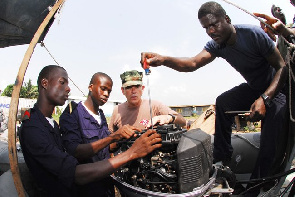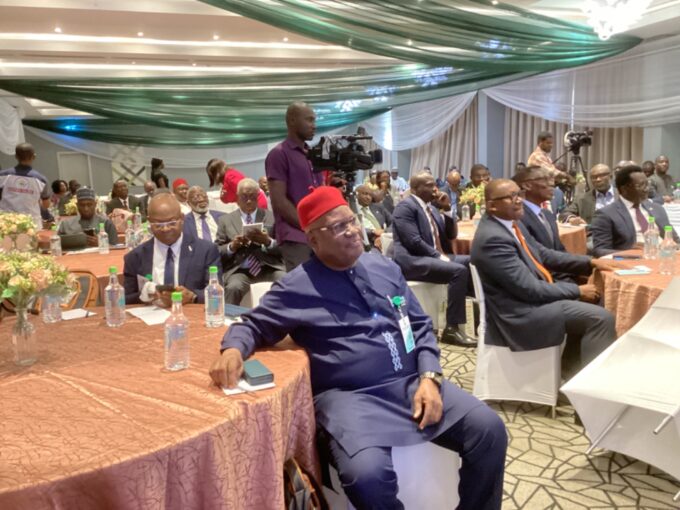Anything can happen at anywhere at any time’ – Author
After the June 3, 2015 disaster which was the height of all motor insurance claims in Ghana at least in the past decade, some motor insurance clients were unable to access their insurance claims and this was a source of worry to many an insured person/entity.
Some automobile garage owners/vehicle repair workshops in the capital were reported to have allegedly persuaded their clients, whose vehicles were lost to the floods, to consider them a total loss (i.e., without compensation from the garages), describing the cause of the loss as a natural disaster or an act of God.
Victims who resorted to some of their insurers had the shock of their lives when their insurers showed them ‘the rule book’. Letting go of expensive luxury vehicles could actually cripple some individuals and in some cases corporate clients!
Indeed, consumers have an equal responsibility to always take self-precaution (e.g., insurance), as this will not only provide them protection or security against unexpected losses, but also the peace of mind to focus on other aspects of life.
A recent occurrence
A friend sent his vehicle to a vehicle repair workshop for some work to be done on it. By the following day, news got to him that his car had been completely burnt after a mentally deranged man torched a number of vehicles at the workshop including his.
As complex as the situation was, there was suspected arson by a madman! Confident that he would fall on the insurance company to make a claim, he was disappointed when the insurance Company told him they could not pay the claim once the incident occurred in the premises of a repair workshop! As it’s often said, ‘it does not rain; it pours’, the vehicle was insured under a third party cover.
Additionally, it is technically unacceptable for an insurance company to pay claims on losses occurring in a workshop as it is expected that the shop owners would have their own insurance in place to take care of some of these accidents.
As fate would have it, the workshop didn’t have any insurance and didn’t even know there was a need for them to do so. He lost the car with no fault of his and compensation from the workshop owner!
What we should know
In a previous article in this column, I posited that, with motor insurance, anytime a vehicle is checked in for servicing or repairs at a workshop, which could take some days, months, the insurance cover on the vehicle AUTOMATICALLY CEASES.
In this regard, it is the insured individual’s responsibility to officially notify his / her insurers to either suspend cover on the vehicle and return premium or extend the expiry date of the cover by the number of days the vehicle remains at the workshop, since the insurer may not be obliged to pay claims that may arise whilst the vehicle is at the workshop, in the custody of the service provider.
What should vehicle wo insrkshop ownersure?
It is obvious that the insurers of the workshops would not pay third party claims in the aforementioned situation, as the likely policy in place at the time of the fire could be a standard fire policy with extension to cover flood and other allied perils.
The insurers would not in this circumstance assume a risk which is not catered for. It is, therefore, the duty of every vehicle repair workshop owner to obtain a blanket public liability policy to cover the following:
Professional Indemnity Cover – it is expected that these workshops obtain a Professional indemnity cover for all its professionals to protect them against any liability at law in the discharge of their duties.
Public Liability Cover – workshops of automobile companies owe motor vehicle owners a duty of care once the vehicle enters their premises and in their custody hence, the expectation that they would have this cover to compensate any vehicle owner on account of damage to their vehicle.
Do the workshop owners know this?
Even though this information is made known to the well-organised automobile companies, some of them still go to the extent of issuing disclaimers as force majeure to the effect that they would not be held liable in the event of any direct or indirect damage done the vehicle and this includes while the vehicle is being road-tested.
While the primary focus of the disclaimer is against valuables kept in the vehicle at the time of the loss, nonetheless, most of the well-established auto firms take responsibility for accidental damage on customers’ vehicles during road-tests or any other damage during repair works.
Speaking to some renowned automobile dealers, they cited the fact that it’s not always the case that they do not want insurance but some insurers are not willing to provide cover for their garages due to the high risks associated with working in a garage or in certain high risk and/or flood-prone environments.
Words of advice to members of the motor insuring public
Generally, motor accidents may be caused by the owner/user or someone else. At the workshop, however, one’s motor vehicle could get burnt, damaged or carried away by flood waters.
In any event, once the loss occurred while the vehicle is at the garage or workshop, one will only get compensated if the garage has appropriate insurance, as discussed above.
The way forward
As required by the Insurance Act 2006, Act 724 that all commercial buildings are insured with an insurance company against the hazards of collapse, fire, earthquake, storm and flood, and an insurance policy issued for it, auto workshop owners must be aware that they fall under this category.
Many vehicle owners have had to suffer this fate in years gone by and many continue to suffer a similar fate as did my friend.
For starters, the NIC and the Ghana National Fire Service task force must throw their lenses on engaging with garage/workshop owners including what we call ‘fitting shops’ and provide them adequate education on this all-important issue, which could significantly transform their operations, whiles expanding the insurance reach in Ghana.
When the risks associated with their services are transferred to insurers, their clients who may suffer losses on account of their vehicles while they remain in their custody would be paid their claims.
That notwithstanding, workshop owners must also take seriously the safety requirements within their premises as this would make it easier for insurers to accept the risks.
Similarly, the insuring public must always ensure they notify their insurer anytime they are going for repairs/servicing. This should be done between the day of handing over the vehicle to the service centre and the day it would be ready for delivery. Besides, it is always important to ask questions!
Source Ghanaweb














